Ask, inquire和require区别
- 格式:doc
- 大小:24.00 KB
- 文档页数:2
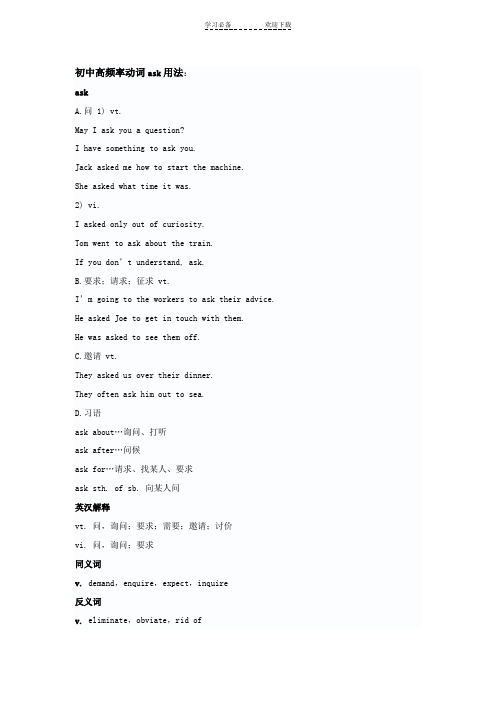
初中高频率动词ask用法:askA.问 1) vt.May I ask you a question?I have something to ask you.Jack asked me how to start the machine.She asked what time it was.2) vi.I asked only out of curiosity.Tom went to ask about the train.If you don’t understand, ask.B.要求;请求;征求 vt.I’m going to the workers to ask their advice. He asked Joe to get in touch with them.He was asked to see them off.C.邀请 vt.They asked us over their dinner.They often ask him out to sea.D.习语ask about…询问、打听ask after…问候ask for…请求、找某人、要求ask sth. of sb. 向某人问英汉解释vt. 问,询问;要求;需要;邀请;讨价vi. 问,询问;要求同义词v. demand,enquire,expect,inquire反义词v. eliminate,obviate,rid of词汇辨析ask,beg,demand,require,request,implore,claim,pray,entreat这些动词均有“要求,请求”之意。
ask 最普通用词,指向对方提出要求或请求,长、晚辈,上下级之间都可使用。
beg 指恳切地或再三地请求或要求,常含低三下四意味,也多用于应酬场合。
demand 一般指理直气壮地提出强烈要求,或坚持不让对方拒绝的要求。
require 强调根据事业、需要或纪律、法律等而提出的要求。

The Basics of First Aid四级匹配题答案教学目标Teaching aims 通过本单元的教学,学生了解有关急救的常识,在生活中如何处理一些突发事件,然后实施紧急救护等总结,归纳情态动词的用法,如:should/shouldn’t; must/mustn’t ;ought to等表示义务和责任的用法。
Teaching important and difficult points1.Wordsknee, still, bite (bit, bitten/bit), lay (laid, laid), mouth-to-mouth, bum, cut, electric, container pool, breathe, within, handkerchief, wound, safety, wire, guard, sideway, firm, firmly wherever, stomach, injure, injured, injury, poison, quantity, nearby 2.Phrases first aid, ought to, medical care, by mistake, pay attention to, in a short while, deal with, take it easy, running water, out of one’s reach, throw up, hold up3. Useful expressionsWe must carry her to the side of the road.You mustn’t move someone if they are badly hurt.Parents should know some first aid.You shouldn’t get up if you are badly hurt.I ought to go home.I have to cook supper for my grandmother.4. GrammarRevise Modal Verbs : must, shouldStudy Modal Verb: ought to教学建议课文建议教师精心安排学生大声朗读课文,理解课文含义,通过写作,教师对学生可以小组讨论,回答,口语练,读出救护方法等,教师给学生展现几组图片,协助学生学会通常的救护措施和家庭安全常识。
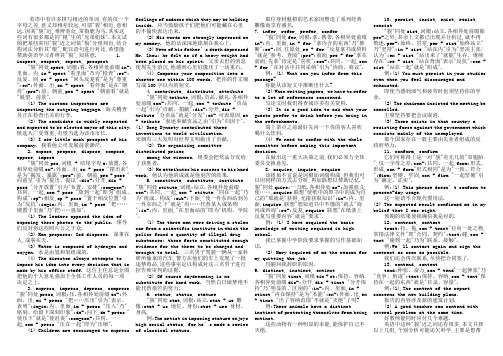
英语中有许多拼写相近的单词,有的仅一个字母之差,意义却相差较远,可谓"貌"相近,意相远.因其"貌"近,难辨者众,常指鹿为马.其实这些词有很多都是同"根"生的"兄弟姐妹".本文试图把某些常用"貌"近之词依"貌"分组列出,结合构词法分析其"根",配以语句进行对比,希望能帮助英语学习者辨其"貌",知其意. 1. inspect, respect, expect, prospect"貌"同处spect,词根:看.各相异处前缀in-:里面、内,in + spect "看里面"乃为"检查";re-:反复、回,re + spect "回头反复看"是为"尊重";ex-:外面、出,ex + spect "看外面"是在"期待";pro-:前、朝前,pro + spect "朝前看"就是"展望、前景".(1) The customs inspectors are inspecting the outgoing baggage. 海关稽查员正在检查出关的行李.(2) The candidate is widely respected and expected to be elected mayor of this city. 候选人广受尊重,有望当选为该市市长.(3) I see little much prospect of his company. 我看他公司发展前景渺茫.2. expose, propose, dispose, compose, oppose, impose"貌"同处pos,词根 + 结尾字母e:放置.各相异处前缀ex-:外面、出,ex + pose "摆出来"是为"揭发、暴露";pro-:前、朝前,pro + pose "向前呈"引为"提出、提议";dis-:分开,dis + pose "分开放置"引为"布置、安排";com=con-:共同、一起,com + pose "放到一起"即为"组成、构成";op-:相反,op + pose "置于相反位置"引为"反抗";im=in:内、里面,im + pose "把……硬置于里面"乃"把……强加".(1) The leaders opposed the idea of exposing these photos to the public. 领导们反对将这些照片公之于众.(2) Man proposes; God disposes. 谋事在人,成事在天.(3) Water is composed of hydrogen and oxygen. 水是由氢和氧组成的.(4) The director always attempts to impose his idea into every decision that is made by his office staff. 这位主任总是企图把他的个人意见强加于全体工作人员的每一项决定之上.3. express, impress, depress, compress "貌"同处press,词根:压.各相异处前缀ex-:外面、出,ex + press "把……压出"引为"表示、表明";im=in:内、里面,im + press "压入"乃"铭刻、给留下深刻印象";de-:向下,de + press "使压下"就是"使沮丧";com=con-:共同、一起,com + press "压在一起"即为"压缩".(1) Children are encouraged to express feelings of sadness which they may be holdinginside. 应当鼓励孩子们把他们可能藏在心里的不愉快表达出来.(2) His words are strongly impressed onmy memory. 他的话深深地铭刻在我心上.(3) News of his father’s death depressedMr. Zhou; he felt as if a heavy weight hadbeen placed on his spirit. 父亲去世的消息使周先生消沉,他感到心里好像压了一块重石.(4) Compress your composition into ashorter one within 100 words. 把你的作文缩写成100字以内的短文.4. contribute, distribute, attribute"貌"同处tribute,词根:贡品、献礼.各相异处前缀con-:共同、一起,con + tribute "贡品一起"引为"贡献、捐献";dis-:分开,dis +tribute "分贡品"就是"分发";at- 可表原因,at+ tribute "表述奉献贡品之由"引为"归因于".(1) Song Dynasty contributed threeinventions to world civilization.宋朝有三大发明对世界文明做出了贡献.(2) The organizing committeedistributed prizesamong the winners. 组委会把奖品分发给了获胜者.(3) He attributes his success to his hardwork. 他认为他的成就是他刻苦的结果.5. constitute, substitute, institute"貌"同处stitute,词根:站立.各相异处前缀con-:共同、一起,con + stitute "同在一起"乃为"组成、构成";sub-:下面,"使一件东西站到另一件东西之下"就是"用……代替某人或某物";in-:内、里面,"在里面站的"即为"机构、学院".(1) The three men were driving a stolencar from a scientific institute in which thepolice found a quantity of illegal drugsubstances; these facts constituted enoughevidence for the three to be charged andbrought to trial. 三名男子驾驶一辆从一家科研所偷来的汽车,警方在他们的车上发现了一批违禁毒品,这些事实足以构成对这三名男子进行控告和审判的证据.(2) Of course daydreaming is nosubstitute for hard work. 当然白日做梦绝不能代替艰苦的努力.6. statue, status, stature"貌"同处stat,词根:站立.stat + ue 雕像;stat + us 地位、身份;stat + ure 身材、身高.例:The artist in imposing stature enjoyshigh social status, for he’s made a seriesof classical statues.那位身材魁梧的艺术家因塑造了系列经典雕像而享有盛名.7. infer, refer, prefer, confer"貌"同处fer,词根:拿、携带.各相异处前缀in-:内、里面,in + fer "拿内含的东西"乃"推断";re-:回,往原处,re + fer "反复拿书或资料"就是"参考、查阅";pre-:前面,pre + fer"拿在前面,先拿"肯定是"喜欢";con-:共同、一起,con+ fer "在对话中共同采纳"引为"协商、商议".例: (1) What can you infer from thispassage?你能从该短文中推断出什么?(2) When writing papers, we have to referto a lot of references concerned.写论文时我们得查阅许多有关资料.(3) It is a good idea to ask what yourguests prefer to drink before you bring inthe refreshments.端上茶点之前最好先问一下你的客人喜欢喝什么饮料.(4) We need to confer with the wholecommittee before making this importantdecision.在做出这一重大决策之前,我们必须与全体委员交换意见.8. acquire, inquire, require该组虽不宜说是词根加词缀构成,但我们可以用同样的方式去分析,再加联想以帮助记忆."貌"同处quire:一刀纸.各相异处ac-:加强意义,使……,acquire联想"使纸中的即书中的成为自己的"那就是"获得,尤指获取知识";in-:内、里面,inquire 联想"想知道书中不懂的"就去"询问或咨询";re-:反复,require 联想"在纸条上反复写重要内容"就是"要求".例: (1) I have acquired the basicknowledge of writing required in highschool.我已掌握中学阶段要求掌握的写作基础知识.(2) Mary inquired of me the reason formy quitting the job.玛丽问我辞职的原因.9. distinct, instinct, extinct"貌"同处tinct,词根tin + ct:保持、容纳.各相异处前缀dis-:分开,dis + tinct "分开保持"乃"明显的、区别的";in-:内、里面,in +stinct "内在保持"是为"本能";ex-:外面、出,ex+ tinct "出了容纳范围"不就是"灭绝"了吗?例:These animals have a distinctinstinct of protecting themselves from beingextinct.这些动物有一种明显的本能,能保护自己不灭绝.10. persist, insist, exist, resist,consist"貌"同处sist,词根:站立.各相异处前缀除per-之外,其余上文都已出现并分析过,就不再赘述.per-:始终、贯穿,per + sist"始终站立"乃"坚持";in + sist "站在内"引为"坚决主张/认为";ex + sist "站出来了"就能"生存、继续存在";re + sist "站在背面"表示"反抗";con +sist "站在一起"就是"组成".例:(1) You must persist in your studieseven when you feel discouraged andexhausted.即使当感到泄气和疲劳时也须坚持你的学业.(2) The chairman insisted the meeting becancelled.主席坚持要把会议取消.(3) There exists in that country aresisting force against the government whichconsists mainly of the unemployed.那个国家存在一股主要由失业者组成的反政府势力.11. conform, confirm它们可称得上是一对"貌"差无几的"双胞胎",仅一字母之差.con-:共同、一起,form:形式、形成,con + form"形式相同"是为"一致、符合";firm:坚硬、牢固,con + firm "一起坚硬"引为"确定、证实".例:(1) This phrase doesn’t conform topresent-day usage.这一短语不合现代惯用法.(2) The expected result confirmed me in mybelief that I was right.预期的结果使我确信我是对的.12. contract, contacttract:拉、拖,con + tract"拉向一处之物,常指法律文件"即"合同、契约";tact:碰,con +tact "碰到一起"乃为"联系、接触".例:We’ll contact again and sign thecontract as soon as possible.我们还会再次联系,尽快把合同签了.13. contend, contenttend:伸张、奋力,con + tend"一起伸张"乃"竞争、角逐";tent:保持、容纳,con + tent"保持在一起的东西"就是"目录、容量".例:(1) The content of the reportconcerns the new building plans.报告的内容涉及新的建筑计划.(2) A good teacher can contend withseveral problems at the same time.好教师能同时应付几个难题.英语中这种"貌"近之词还有很多,本文只择以上几组,个别分析可能还欠科学,主要是想帮助英语学习者利用一切办法并举一反三,掌握其"貌"同处,辨清相异点,最终识得这些"双胞胎或多胞胎兄弟姐妹",并准确使用.本资料来源于《七彩教育网》。
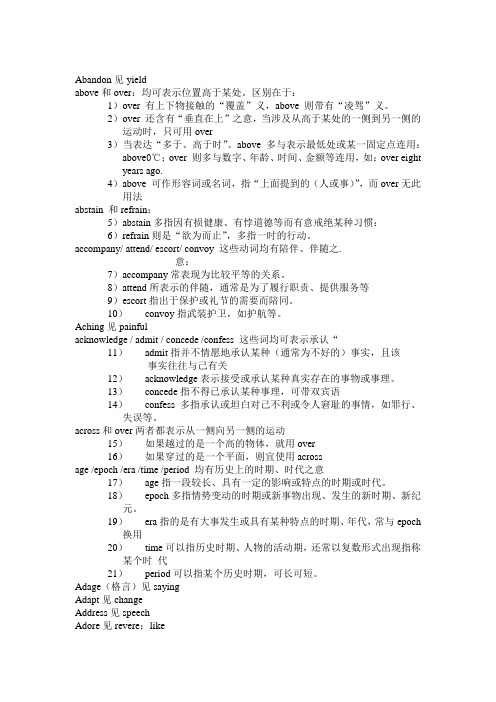
Abandon见yieldabove和over:均可表示位置高于某处。
区别在于:1)over 有上下物接触的“覆盖”义,above 则带有“凌驾”义。
2)over 还含有“垂直在上”之意,当涉及从高于某处的一侧到另一侧的运动时,只可用over3)当表达“多于、高于时”。
above 多与表示最低处或某一固定点连用:above0℃;over 则多与数字、年龄、时间、金额等连用,如:over eightyears ago.4)above 可作形容词或名词,指“上面提到的(人或事)”,而over无此用法abstain 和refrain:5)abstain多指因有损健康、有悖道德等而有意戒绝某种习惯:6)refrain则是“欲为而止”,多指一时的行动。
accompany/ attend/ escort/ convoy 这些动词均有陪伴、伴随之.意:7)accompany常表现为比较平等的关系。
8)attend所表示的伴随,通常是为了履行职责、提供服务等9)escort指出于保护或礼节的需要而陪同。
10)convoy指武装护卫,如护航等。
Aching见painfulacknowledge / admit / concede /confess 这些词均可表示承认“11)admit指并不情愿地承认某种(通常为不好的)事实,且该事实往往与己有关12)acknowledge表示接受或承认某种真实存在的事物或事理。
13)concede指不得已承认某种事理,可带双宾语14)confess多指承认或坦白对己不利或令人窘耻的事情,如罪行、失误等。
across和over两者都表示从一侧向另一侧的运动15)如果越过的是一个高的物体,就用over16)如果穿过的是一个平面,则宜使用acrossage /epoch /era /time /period 均有历史上的时期、时代之意17)age指一段较长、具有一定的影响或特点的时期或时代。
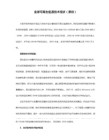
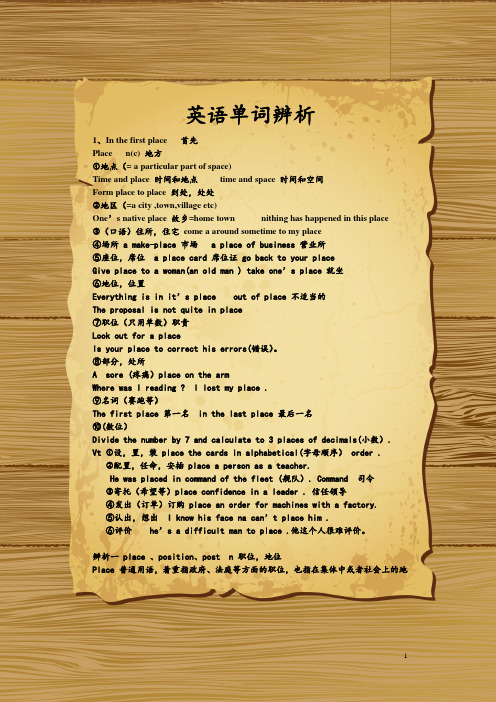
英语单词辨析1、In the first place 首先Place n(c) 地方①地点(= a particular part of space)Time and place 时间和地点time and space 时间和空间Form place to place 到处,处处②地区(=a city ,town,village etc)One’s native place 故乡=home town nithing has happened in this place③(口语)住所,住宅come a around sometime to my place④场所a make-place 市场 a place of business 营业所⑤座位,席位 a place card 席位证go back to your placeGive place to a woman(an old man ) take one’s place 就坐⑥地位,位置Everything is in it’s place out of place 不适当的The proposal is not quite in place⑦职位(只用单数)职责Look out for a placeIs your place to correct his errors(错误)。
⑧部分,处所A sore (疼痛)place on the armWhere was I reading ? I lost my place .⑨名词(赛跑等)The first place 第一名in the last place 最后一名⑩(数位)Divide the number by 7 and calculate to 3 places of decimals(小数).Vt ①设,置,装place the cards in alphabetical(字母顺序)order .②配置,任命,安插place a person as a teacher.He was placed in command of the fleet (舰队). Command 司令③寄托(希望等)place confidence in a leader . 信任领导④发出(订单)订购place an order for machines with a factory.⑤认出,想出I know his face na can’t place him .⑥评价he’s a difficult man to place .他这个人很难评价。
美联英语提供:中考英语复习资料--初中英语常用同义词辨析(10)词类、句子成分和构词法ashamed, shameful这两个形容词均含“羞愧的”之意。
ashamed :用于人,指因干了错事、坏事或傻事等而感到羞愧。
shameful :指人或人的行为本身不光彩、不道德。
ask, demand, inquire, question这些动词均含有“问,询问”之意。
ask :最普通用词,可与demand, inquire和question换用,但ask用于口语中,指提出问题让人回答。
demand :指根据自己的权利、职责或身份认为有必要弄清情况而正式发问,常隐含命令对方回答的意味。
inquire :较正式用词,指为得到真实情况而详细询问或调查了解。
question :指因感到可疑或为了解情况,弄清究竟而发问,有时指一连串的发问。
ask, beg, demand, require, request, implore, claim, pray, entreat这些动词均有“要求,请求”之意。
ask :最普通用词,指向对方提出要求或请求,长、晚辈,上下级之间都可使用。
beg :指恳切地或再三地请求或要求,常含低三下四意味,也多用于应酬场合。
demand :一般指理直气壮地提出强烈要求,或坚持不让对方拒绝的要求。
require :强调根据事业、需要或纪律、法律等而提出的要求。
request :正式用词,指非常正式,有礼貌的请求或恳求,多含担心因种种原因对方不能答应的意味。
implore :书面用词,着重指迫切、焦急或痛苦地恳求或哀求,常含较强的感情色彩。
claim :指有权或宣称有权得到而公开提出的要求。
pray :语气庄重,指热情、诚恳和敬祈的要求,现不很常用。
entreat :泛指一般“恳求或哀求”,含企图说服对方或用热烈的请求软化反对意见的意味。
assert, affirm, allege, maintain, testify, claim这些动词均含有“断言,声称”之意。
学习英语最常遇到的问题,便是词汇不足。
词汇不足的人在英文听、说、读、写各方面的能力都会受到严重限制。
所以词汇量的多少在英语学习中占有重要地位。
一般认为背单词是件既吃力,又往往成效不彰的苦差事。
实际上,若能采用适当的方法,是可以缩短扩大词汇量所需的时间,并且提高记忆单词的质量的。
下面将介绍五种单词记忆法。
一、结合记忆法。
将比较生疏,不常用的单词放入一定的语言环境——句子中,结合句意来记忆单词。
遇到此单词时,若词义忘记,则可通过回忆所在句子的意思来记忆单词。
例如:slopen. ①倾斜;坡度;斜度There is always a certain slope in a ship's deck.船的甲板总有几分倾斜。
②斜面;斜坡We climbed the steep slope of the hill.我们爬了那座陡峭的倾坡。
vi.倾斜。
The railroad slopes up slightsly at this point.铁路在此处有轻微的倾斜。
criticaladj. ①批评(性)的,吹毛求疵的I don't like people who are too critical about everything.我不喜欢对每件事都太吹毛疵的人。
②紧要的,关键的;危急的His condition is reported as being very critical.据报告他的情况非常危急。
通过此法来掌握词汇,既有助于记住单词本身的拼写、拼读,又可同时熟悉词的词义、词性、用法和搭配,比孤立地背记单词效果要好。
二、同类记忆法。
将同类词汇收集在一起,同时背记。
注意,同类词汇与同义词不同:同义词是指意思相同,而同类词是指基本属性相同、具体意义的层次,级别或范围不同的一类词汇。
如headmaster和principal是同义词,都表示,“中小学校长”;president和chancellor是同义词,都表示大专院校“校长”。
人教版高中英语必修5《Unit 5 first aid》教案人教版高中英语必修5《Unit 5 first aid》教案【一】一、教学内容分析本单元以“急救”为中心话题。
本案例把教材的Warming up 和Reading部分结合起来,旨在通过教学,使学生了解相关的急救知识,并能用所学的有关first aid的知识,根据不同情况提出急救措施。
同时通过教学激发学生进一步学习急救知识的兴趣和树立安全意识,意义重大。
二、教学目标1、语言目标:学习掌握教学内容中的重点字、词、句;2、能力目标:阅读速度和技巧的训练;3、情感目标:教育学生帮助他人于危急时的良好情操;通过讨论等小组活动培养协作精神;通过课堂教学活动激发学生英语学习兴趣。
三、学习者特征分析所执教的班级学生是我从高一开始教的,到了高二已经有了一定的英语基础。
该班学生的主要特点是能讲敢讲(我在这方面一直鼓励学生),课堂气氛活跃。
本单元的教学内容与生活实际相结合,学生比较熟悉这个主题内容,也能引起他们的表达欲望和学习兴趣。
四、教学策略选择与设计教学策略主要以任务型教学(Task-based Teaching)为主,通过多媒体课件以及安排多个课堂教学活动贯穿整个课时,侧重培养学生的阅读能力。
五、教学重点及难点教学重点:帮助学生使用不同的阅读技巧完成阅读目标教学难点:1.学生阅读能力的培养,运用文中信息解决问题的能力;2.掌握急救知识和根据不同情况提出急救措施;3.能学会急救知识和相关急救措施的英语表达。
六、教学过程教师活动学生活动设计意图Step 1. Leading-in1. Greetings2. What words can you think of when talking about home accidents and first aid?3. First aid quiz (according to the pictures shown on Page 33)4. Definition of first aid: a temporary form of help given to someone who suddenly falls ill or gets injured before a doctor can be found.GreetingsBrainstorming(cut, nosebleed, choking, burn...)Watch, read and think, then work in groups to make the choicesRead aloud and understand the definition通过问题自然引入本课内容日常急救知识小测试,使学生自然顺利进入新课学习让学生朗读理解定义Step 2. Pre-readingPresent the picture on Page 33 and ask the students to answer the questions of Pre-reading.Ask the students to look at the title and subtitle, and predict: What may be written in the text? Look at the picture carefully and discuss in groups. Choose one student to give the answers. (Answers can vary)Students look at the title and subtitle and give their prediction. 利用课文图片导入主题:FIRST AID FOR BURNS 培养学生通过标题和小标题预测阅读内容的能力,也激发学生进一步阅读以验证预测Step 3. While-readingReading for general idea1. Make the students to skim the passage in limited time and get a general idea, then ask the students to divide the passage into 5 parts.2. In which order are these topics covered in the text?(Page 35)Reading for details (Get the students to read the text part by part)1. Ask the question:What is skin? What can get the skin burned? What is the function of the skin?2. Types of burns and their characteristics. Do Ex.2 of Page 35.(Label the pictures)3. Answer the following questions. (Ex.3, Page 35)Students skim the passage to find the answer.Students work individually to give the right answers.Students read and find out the answers. Do related exercises.限时阅读培养学生快速阅读的能力和通过略读理解大意独立完成,培养学生独立学生的能力,同时也是为了充分了解学生的课文理解情况培养学生把握文章细节的能力; 培养学生通过阅读寻找所需信息的能力; 培养学生根据信息进行判断的能力Step 4. Post-reading1. Give a few minutes for the students to read after the tape.2. Ask the students to judge the treatments of Ex.4.3. Ask the students to practise to give first aid treatments to different burns and then act it out.Students read aloud after the tape.Students read and make their judgement.Students practise in groups and act. 语音语调锻炼,同时也使得学生进一步理解所学课文本环节为输出阶段,目的在于检查学生的学以致用创设活动任务,培养学生解决实际问题的能力Step 5. Homework1. Get more about first aid from the newspaper, magazine or the Internet.2. Find out the important and difficult words and expressions to you and finish exercises on page 36.Students get ready for homework. 所布置的作业把学生的学习任务从课堂延伸到课外,有利于巩固课堂所学和进一步让学生掌握更多的急救知识七、教学评价设计评价采用了自我评价、小组比赛、学生互评和教师评价相结合的方式。
常见动词辨异1.accept接受(答应收下);receive收到;get得到(指经过努力)。
(accept + 抽象名词:invitation,plan,explanation等,receive十具体名词:letter, report cheque等)2.acknowledge (公开)承认;admit (勉强)承认;confess (对错误、罪)坦白3.accomplish;achieve;complete;fulfil;finish完成 accomplish 表示成功,强调完成的结果而不是过程,词源意义是“终于完成了”某事。
achieve完成,实现,达到(强调通过努力达到的目的)。
如:to achieve the desired resultcomplete完成,完结(表示积极的完成某个具体的事情)。
如:They have completed their task.fulfil履行,实现,完成。
普通用词语,意为完成使命,几乎与前面任何一词换用。
如:to fulfil a promisefinish完毕,结束,完成。
最常用语,后接v-ing,表示完成了最后的一步或阶段。
4.accuse;charge指控accuse谴责,指控,告发。
charge指控。
charge sb.for...向某人索取;charge sb.with指控某人(某罪)。
如:He charged me l00 dollars for mending the wall.to charge her with having stolen the ring5.acquire;require;inquire获得;需要;询问acquire取得,获得,学到(正式用语,通过自己不懈的努力才获得) 如:acquireknowledgerequire需要。
如:Automobiles require good roads.inquire访问,打听。
相似却不相同:英语中Ask, inquire和require区别
这篇文章将讲述如何正确的使用“ask”,“inquire”和“require”。
中文意思十分接近的三个词,却仍然有着细微的差别,透过这样的差别我们还可以了解一些英语的趣味历史。
“Ask”,“inquire”和“require”到底有着什么样的差别呢?什么时候用哪一个词比较合适?既然中文意思差不多,能相互替代着使用吗?
这些问题体现出了英语学习过程中一些有趣的细微差别给学习者造成的困扰。
让我们就从这三个词着手,看看他们是怎样的相似却又怎样的不同吧。
首先,你应该先注意到“inquire”和“require”看起来和读起来都差不多,而“Ask”在这外观和读音上和他们比起来,已然是一个外家人了。
其实不难看出这与英语的历史有些关联,虽然故事很多,不过现在你只需要知道,“inquire”和“require”来源于拉丁语,而“Ask”来源于古老的英语。
大约在1000年以前,英语只是一个欧洲北方国家语言的混合体。
接着,英语又深刻的受到了源于拉丁语的法语的影响。
到了如今,英语有着太多的根源,因此也让我们可以就同一个事情有着各种不同的表达。
现在,我们总是不假思索的将新老词汇在英语表达中进行混合使用。
但是了解这些同义词的细微差别,可以帮助你在英语口述与写作时选择更适合的英文单词进行使用,同时也可以学习到动词中的一些诡异拼写的由来。
其实也不是那么的诡异,只不过他们遵从了古老英语的规则罢了。
通常的说,起源于拉丁语的英语单词会长一些,并且可以被分割成几个部分。
就好象分为了前置词、后置词和词根。
如,“inquire”和“require”就包含了同一词根“quire”。
“Quire”来源于拉丁语,本意与寻求或是搜索有关。
而前置词“in”与“re”加在了词根之前,则形成意思上略有不同的两个单词。
相比之下,“ask”只一个来源古老英语的典型案例:词短、有着许多含义、可以在各种情况下灵活使用。
三个英语单词都是表示询问的动作,但是却在不同的环境中使用。
“Ask”是三个单词中最灵活的一个,可以在各种环境中使用。
它既是及物动词也是不及物动词,你可以ask someone to do something、ask for the bill、ask around 或ask to leave。
“Inquire”是询问信息的意思,同样也可以是及物动词和不及物动词,所以你可以inquire about the weather、inquire why they are leaving 或inquire after his mother。
“Require”意味着一种需求,只是及物动词,因此在使用时需要指明对象。
你可以Require some new supplies或是require her to finish on time。
现在你知道了各个单词的意思,但是相信对什么时候使用及如何正确的使用依然感到模糊不清。
“Ask”几乎可以用在所有的情况之中,而“inquire”和“require”只能在某个特定的环境下使用。
你需要在用英语写作时注意到,凡是来源于拉丁语及希腊语的英语单词,通常含义都很确切,表达的也很精准。
但是,如果你用这些起源拉丁的英语单词过多,会使你的文章或表述看起来很不自然。
首先保证表达上的简单明了,之后再逐渐的学习使用一些华丽的词汇来进行修饰。
ask for, require, demand
(1)ask for指要求得到具体的物质的东西,普通用词。
也可用ask sb.to do sth.表示“要求某人做某事”,语气较客气。
e.g. He asked for some money.
他让了一些钱。
He asked his mother to wake him at six in the morning.
他让他母亲早上六点叫醒他。
I asked that I (should be) was allowed to see her.
我请求允许我看望她。